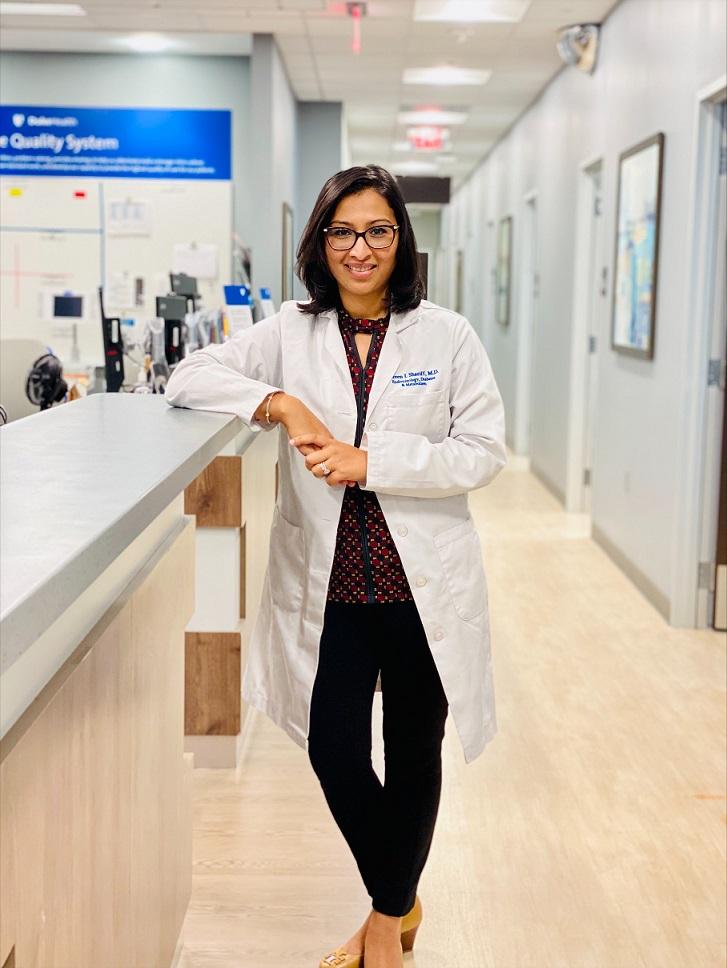
In elevating Duke’s endo-oncology care from clinic to program status in January 2022, the first priority for endocrinologist Afreen Shariff, MD, was to address the access to care bottleneck and get cancer patients to see endo-oncologists in a timely manner by reducing the average 87-day wait time for referrals.
Nearly eight months later, the average wait time for receiving recommendations from the endocrine team at Duke Endo-Oncology Program—a transdisciplinary program between Duke Cancer Institute and the Department of Medicine Division of Endocrinology, Metabolism and Nutrition—is now two days.
Shariff created a cancer focused electronic consult service with Duke Telehealth Services to provide expert triage through electronic consultations and acuity-based access to Endo-Oncology clinic providers. The intervention not only reduced wait times but reduced hospital admissions for endocrine toxicities from 11% down to 4% in Duke cancer patients, she reports.
Her mission, Shariff explains, is to create an enhanced transdisciplinary program that will allow cancer patients with incident and existing diseases of the endocrine system to continue effective cancer therapy while receiving the highest quality care through innovation, collaboration and compassion.
Endo-oncology is an emerging field at the interface of oncology and endocrinology that specializes in caring for cancer patients living with new or pre-existing endocrine disease. Both cancer and cancer treatments are associated with a wide variety of endocrine diseases including pituitary dysfunction, new and worsening diabetes, steroid induced hyperglycemia, drug induced thyroid abnormalities, bone disease and primary malignancies of endocrine glands resulting from direct damage or radiotherapy.
These effects are well established in chemotherapy treated patients and childhood cancer survivors. More recently, novel targeted cancer therapies, including those that target the insulin signaling pathway and immune checkpoints for example, have become staple treatments for many aggressive tumors due to their success in preventing cancer progression and improving cancer-free survival.
Shariff, who has over seven years of experience in treating cancer and cancer treatment related endocrine toxicities, identified an unmet need for specialized cancer support and started an immunotherapy focused clinic in 2017 to address it. Over the last five years, the practice has grown, and these agents are now FDA approved for more than 30 malignancies.
Shariff is adding two providers to the group. A nurse practitioner is scheduled to start in August with plans to add a second under consideration.
“Demand has certainly grown since we started the program,” she says. “Initially in the clinic we used to see only toxicities from cancer drugs. What flipped or changed in January was that we started including patients with any endocrine side effect from cancer and cancer therapies, for example steroid induced hyperglycemia particularly in patients with preexisting diabetes and optimizing those conditions before they start cancer treatment. That really expanded the scope of the practice."
The Duke Endo-Oncology program has 4 key target areas:
- Value-based subspecialty care for cancer patients
- Transdisciplinary clinical and research infrastructure development
- Multi-disciplinary collaborations
- Education for patients, oncology, endocrinology providers and trainees.
Endocrinology, Shariff explains, is “like an amoeba when it comes to oncology” as it touches many different facets of cancer care. “Now we see oncologists thinking preemptively about these patients before starting therapy because we have a programmatic structure to support them.”
Shariff is also working with the Duke Institute of Health Innovation to develop an AI-assisted clinical decision tool to predict hospitalizations in cancer patients resulting from toxicities. Her vision is that the Endo-Oncology program and its services will support an end-to-end model by predicting, acting and preventing avoidable admissions resulting from common side effects seen in immunotherapy treated patients.
Outside of Duke, Shariff serves as the chair for the Oncoendocrinology Special Interest Group (SIG) at the Endocrine Society where she assists in driving the global mission of enhancing networking, encouraging transdisciplinary collaborations, and influencing evidence-based science, practice, and education.
She also hosts and produces a podcast series called CHECKPOINT NOW that engages oncologists and subspecialists from around the country on collaborative patient care, cutting edge topics and latest evidence on managing immune related and other cancer therapy related toxicities with listeners tuning in globally. Find episodes on https://checkpointnow.org, Apple Podcasts, Google Podcasts, Spotify and other streaming platforms.